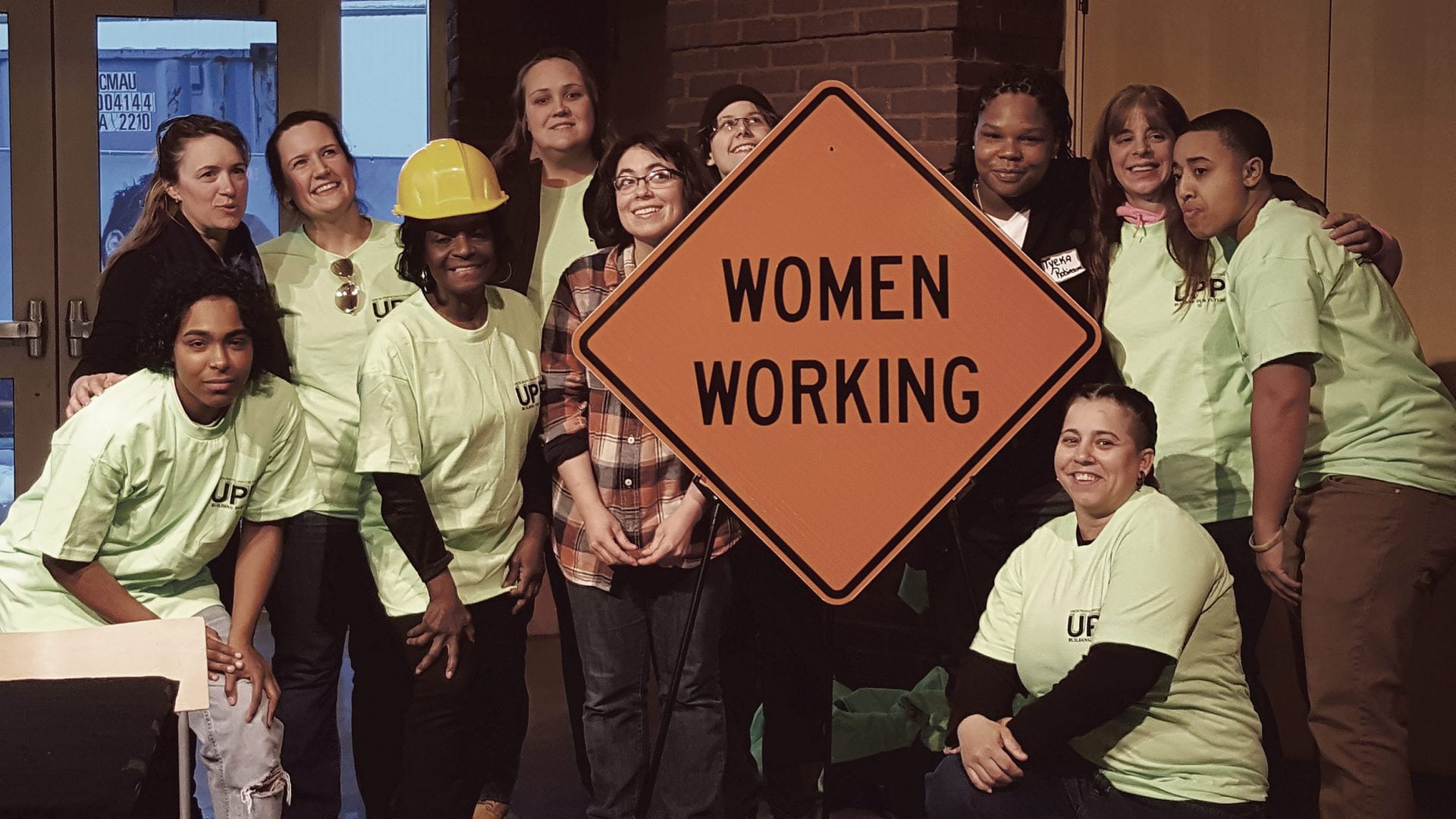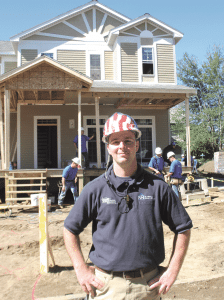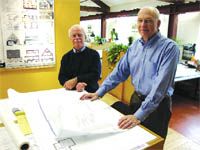Framing the Issue

Local union carpenters gather for a forum on women in construction at Mount Holyoke College.
Construction has long been a male-dominated industry, but the playing field doesn’t have to be so uneven, several carpenters with Local 336 told BusinessWest. They all took different paths to the field, but all say women with an interest in working with their hands shouldn’t shy away from a career society has too often said they’re not suited for. Progress in diversifying the workforce has been incremental, but several regional developments offer reason for optimism.
Lily Thompson laughs when she hears that women can’t handle themselves on a construction site.
“That’s a societal thing as much as anything,” said Thompson, a journey-level carpenter with Local 336 of the New England Regional Council of Carpenters. “If a mother can pick a sleeping child out of bed 2,500 times, there’s no reason she can’t pick up metal studs and shlep stuff around; 90% of this business is moving and fastening.”
Yet, the stereotypical messages persist. “You wouldn’t believe how many times kids are told, ‘that’s a boy thing,’ or ‘that’s a girlie thing,’” she went on, recalling the day her young daughter was helping her install a barn door, and a passerby took note of them and commented, ‘a lady with a saw — how unusual.’
“It doesn’t get any more basic than that,” she said of how gender roles get reinforced in traditionally male professions. “But society has changed a lot lately, and Western Mass. is prime territory for people doing non-traditional things.”
Julie Boucher, another journey-level carpenter, didn’t get those messages at an early age, or, if she did, she ignored them.
“I wanted to be a carpenter since I was a little girl, probably since I was 4 or 5, playing with Lincoln Logs and Legos,” she told BusinessWest. Her route to that career was a circuitous one.
“I went to vocational school and learned the trade, but when I got out, it was difficult to find a job,” she said. “Being a woman, a lot of companies took one look and said I wasn’t needed or wanted, so I got a little discouraged.”
After serving in the Navy for a time before getting a medical discharge and then studying business administration at Holyoke Community College, she again became interested in carpentry, and after a professor handed her a pamphlet for the carpenter’s union, she applied.
“The job can be difficult mentally and physically, and sometimes I think the mental struggle is harder than the physical struggle,” she said. “But if building and working with your hands is something you love to do, you should follow your dreams.”

Katurah Holiness, here pictured at the MGM Springfield site, says she appreciates the different avenues of training available in her union.
Lisa Clauson, director of Strategic Partnerships for the union’s Carpenter’s Labor Management Program, loves testimonials like that one.
“We’ve been working aggressively over the past two years to expand our union’s diversity and ensure we reflect the communities we work in and our members live in,” she said, noting that this effort includes bringing in more men of color, but in particular has focused on recruiting women of all backgrounds.
Tradeswomen, Clauson noted, represent fewer than 3% of the construction industry nationally, and closer to 2% in Springfield. “We, and many other building trades, all have very successful tradeswomen, so it is not an issue of women not being physically capable, but it is an issue of women being recruited and encouraged to do this work — and an issue of contractors being willing to employ them. The construction trades are one of the last industries to diversify opportunities for women.”
Indeed, while female representation in the construction trades rose steadily between the 1980s and 2007, the number then leveled off and has decreased ever since. One factor was certainly the Great Recession, which hit construction hard and chased many professionals out of the field — women at a higher rate.
They should come back, Thompson said, with opportunities on the rise.
“I’ve been doing this almost 16 years,” she said. “The pay and benefits are great, and I work with a great group of people. It’s something I like to do, versus sitting at a desk. I tried making sandwiches and was a receptionist in a hair salon, but that wasn’t where I wanted to be.”
Test of Time
Thompson graduated from Franklin County Technical School in 2001, and decided to focus on carpentry after trying out some trades — auto-body and electrical work, to name two — that she found less appealing.
“I like building things, and seeing things that are long-lasting. You get to look at it and have pride in your work for years to come,” she said, noting that her skills translate well to her personal life, too; she and her husband, a mechanic, bought a run-down property 12 years ago and worked to turn it into a home.
A home is something Katurah Holiness didn’t have when she entered the world of carpentry. An Air Force veteran, she was driving for Uber and sleeping on a series of friends’ couches, and when she got tired of hopping around, she went to stay at Soldier On in Leeds, where she lived for much of 2016 and 2017.
She had never had much interest in carpentry, but one day she gave a union carpenter a ride, and chatting with him piqued her interest. She applied with the union and quickly became an apprentice and got hired on the MGM Springfield job.
“With the carpenter’s union, there are so many avenues you can go as far as interest,” she said. “You can take a welding course, learn about framing and sheetrock … the avenues don’t end. There are a number of things you can get into, specialties and certifications you can train for.”
Her car broke down shortly before she started as a carpenter, and Holiness initially was able to get to work through getting rides with other members and sometimes from other women who lived at Soldier On. Steady work at the union apprentice rate enabled her to save, pay off some of her debts, and eventually move to an apartment.
Besides those pluses, she enjoys the work, and feels at home working alongside almost all men.
“I came from a male-dominated background in the military, so it’s not new to me in the least,” she said. “I can vouch for the men I’ve worked with; they’re for the most part good guys, and they’re willing to train you and educate you if you’re willing to learn.”
That’s not to say some stereotypes of the field aren’t occasionally true, Thompson said, including ribald or condescending teasing.
“I just put in my imaginary earplugs. Its ‘hey, you’ve got your sexy jeans on today,’ or ‘where did you get your boots from, the kids’ section?’ You take it with a grain of salt — smile, wave, give some s–t back when it comes down to it. As for the physical part, well, if you’re active in life and don’t want to go to the gym every day, come give this a whirl.”
The union has been trying to motivate more of that whirl-giving among women in several ways, Clauson said. One is recruiting aggressively from members’ networks, community organizations, career centers and job-training programs, vocational schools, and other sources.
“We’re spreading the word about the opportunities for this work and letting women know that, when this work is done union, they can earn living wages, be fully trained in the craft for free, and get great benefits. Our recruitment work has involved intensive outreach in the vocational schools throughout Western Mass. as well.”
Meanwhile, to retain women in the trade, the union has created a ‘Sisters in the Brotherhood’ chapter for its women to come together regularly to network and support each other.
“We have mentorship programs and are working to educate our members on the value of diversity and the need for harassment-free worksites. We are also working with our contractors on these issues,” she explained.
Finally, the union has been persuading developers to require diversity in their contractors.
“This last step is key to ensuring women get hired and get work,” she said. “Contractors are slow to change their hiring practices, but if owners of construction work require them to bring in a diverse workforce, they will do so. This often gives women — and people of color — a foot in the door to demonstrate their work ethic and skills, and many are then kept for other jobs that don’t have requirements.”
Success stories in this realm have included MGM, with women accounting for at least 6.9% of all work hours, people of color 15.3%, and veterans 8% — minimums that are consistently being exceeded. “MGM is a remarkably different worksite than most,” Clauson said. “Our women constantly talk about how different it is to be seeing other tradeswomen all around them.”

Lily Thompson takes a break from work renovating Blanchard Hall at Mount Holyoke College.
Meanwhile, the UMass Amherst Building Authority has also set work-hour goals of 6.9% for women and 15.3% for people of color. Three years ago, she added, these goals existed but were ignored, but a compliance officer started enforcing them in 2015, and now the all jobs are exceeding these numbers.
Mount Holyoke College recently completed its first project (a renovation of Blanchard Hall) with work-hour requirements of 7% for women and 16% for people of color. And Smith College recently announced it will require the same percentages on its $100 million Neilson Library project.
Finally, the city of Springfield is reworking the Springfield Responsible Employer Ordinance, which requires city construction contractors to employ 35% Springfield residents, 20% people of color, 6.9% women, and 5% veterans.
“It has largely been unenforced, and they are now creating a new enforcement plan and have recently hired a compliance officer to oversee it,” Clauson said.
Small Steps
Boucher said every additional woman on a job site makes the environment healthier for all women. That’s partly why she coordinates the training center of the union’s apprenticeship mentoring program and helped launched its Sisters in the Brotherhood chapter.
“I naturally wanted to help other people; that’s in my blood,” she said. “I started a mentorship program at my local because I know how important it is to have that support. I wanted to be there for the apprentices coming in and help guide them in any way I can. Not all apprentices want mentoring, but the ones that do, I try to provide a support system for them. We have a great team of mentors to help out.”
The progress achieved in diversifying the construction workforce regionally is exciting, Clauson said, but much more needs to be done.
“Women historically have done many physically demanding and dirty jobs, but traditionally they are doing work of this type in low-wage and low-skilled industries,” she said, citing jobs in cleaning, food service, and personal care. “Construction careers, in contrast, are higher-paid, skilled, and, when unionized, have good wages, free training, and strong benefits. Women need to be able to access these opportunities.”
And be treated equally on the job site, Boucher said.
“There are companies that allow me to do my job, and then companies that don’t allow me to do my job, in the sense that I’ll get put on menial tasks, easy tasks, because my foreman or journeyman I’m working with don’t think I’m capable of doing it. I wish I was challenged a little more. Let me do the framing; let me handle drywall. But that’s not always the case.”
It helps that the union supports workforce training, she added. For example, Boucher earned a construction management degree at Wentworth Institute of Technology in Boston, and the local paid for one-third of the tuition; most of the classes were held at Springfield Technical Community College through an exchange between the two institutions.
Thompson said women are ultimately responsible for taking such opportunities to better their careers. “Women today want to be 50-50, want to feel like they’re equal partners,” she noted. “Whether just out of college or age 50, as long as you’re physically able, there are lots of positions in construction. I didn’t see myself doing this full-time, but it works. I’m much happier than I’d be in an office.”
Holiness agreed. “A lot of people think it’s only for males because they’re stronger, but that’s not true,” she said. “Where there’s a will, there’s a way. There’s nothing you can’t do.”
Joseph Bednar can be reached at [email protected]


























